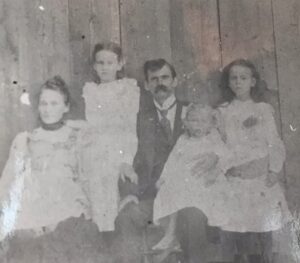One of the terrible weaknesses humans have is the innate tendency to despise or minimize what we have and view what we do not (or cannot) have as being more wonderful. The adage is that the grass always looks greener (to cows) on the other side of the fence.
When we are told that we cannot have something, our inborn rebellion, which the Bible call sin, automatically desires it and sets about to obtain it.
Paul wrote about this sad state of affairs in Romans Chapter Seven.
When we were controlled by our old nature, sinful desires were at work within us, and the law aroused these evil desires that produced a harvest of sinful deeds, resulting in death. Romans 7:5 (NLT)
This is the universal condition of man and a big reason why we so desperately need a Savior.
When God created the earth and the heavens, he gave the earth to us for our habitation, but he reserved the heavens for himself and the angels. The Bible says we live on a stationary plane enclosed by a solid dome called the firmament, in which God placed the sun, moon, and stars. There are multiple levels to the firmament, also called the heavens. We are not told very much about this solid enclosure, except that is a solid crystalline-like structure having multiple layers which separate the waters above from the waters below. (You can read more about this in another article.) We are told that God himself has his throne in the third heaven, which seems to be atop this structure.
And above the firmament over their heads was the likeness of a throne, in appearance like a sapphire stone; on the likeness of the throne was a likeness with the appearance of a man high above it. 27 Also from the appearance of His waist and upward I saw, as it were, the color of amber with the appearance of fire all around within it; and from the appearance of His waist and downward I saw, as it were, the appearance of fire with brightness all around. 28 Like the appearance of a rainbow in a cloud on a rainy day, so was the appearance of the brightness all around it. This was the appearance of the likeness of the glory of the LORD. So when I saw it, I fell on my face, and I heard a voice of One speaking. Ezekiel 1:26–28 (NKJV)
Apparently beyond that is what Jesus called “outer darkness,” which will be a terrible place where those who are rejected at the judgment must dwell.
Then the king said to the servants, ‘Bind him hand and foot, and throw him into the outer darkness; in that place there will be weeping and gnashing of teeth.’ Matthew 22:13 (NASB95)
The lure of “outer space” is a grand deception whereby Satan has convinced us that the place of judgment is somewhere we need to go and conquer.
God never told us that we can inhabit the moon or any other heavenly body. Trying to do so is clearly looking over the fence at grass we cannot have. Satan tried move beyond his assigned area to wrest God’s throne from him. Not surprisingly, he was utterly defeated.
How you have fallen from heaven, O star of the morning, son of the dawn! You have been cut down to the earth, You who have weakened the nations! 13 “But you said in your heart, ‘I will ascend to heaven; I will raise my throne above the stars of God, And I will sit on the mount of assembly In the recesses of the north. 14 ‘I will ascend above the heights of the clouds; I will make myself like the Most High.’ 15 “Nevertheless you will be thrust down to Sheol, To the recesses of the pit. Isaiah 14:12–15 (NASB95)
Satan was cast down to the earth (Revelation 12:9), where he enlists rebellious people to join him in his quest to overthrow God.
Men have tried to reach God’s throne for a long time, beginning at the tower of Babel. More recently, NASA has joined the rebellion by using rockets in an attempt to pierce the firmament and go beyond our assigned domain.
God’s throne resides atop the firmament, and only the privileged are granted access.
Jesus ascended there after his resurrection, where he sits enthroned, waiting for his Abba Father to roll back the firmament on the Last Day. Over the years, prophets have been allowed to see the wonders of this real place. (I have written elsewhere more extensively about heaven being an actual place, not just a spiritual dimension.) All those who proclaim allegiance to Christ will also be given access, but no rocket or any other device will ever penetrate its environs illegitimately.
The moral of the story is this. If we want to see and experience this amazing realm, we must join the winning side by proclaiming faith and allegiance to our Lord Jesus the Messiah.
It is time for us to leave the rebellion and choose to be satisfied with living on the earth until God transports us to heaven to be with him forever.
Prayer
Lord Jesus, forgive me for being part of Satan’s rebellion. Now I see the error of my ways and choose to join you. I believe that you rose from the dead and now reign in heaven as Lord. Thank you for giving me eternal life and the promise of reigning with you forever. Holy Spirit, I welcome you into my life and ask you to transform me on the inside and empower me to tell others about this marvelous good news that we can be reconciled to God. Amen.



 geometric figures and were offended by the “retrograde” motion the paths the “planets” took in the heavens, not realizing that a toroidal electromagnetic force field can produce exactly those kinds of motions. (We are still trying to figure out the way the heavens work in God’s creation, but many suspect we live in such an electromagnetic world, rather that what we have been led to believe.)
geometric figures and were offended by the “retrograde” motion the paths the “planets” took in the heavens, not realizing that a toroidal electromagnetic force field can produce exactly those kinds of motions. (We are still trying to figure out the way the heavens work in God’s creation, but many suspect we live in such an electromagnetic world, rather that what we have been led to believe.)
 war South. The few photos I have of them with their daughters indicate that they lived in poverty. As a result, my grandmother, Leone, spent time in an orphanage before being adopted by the Lightfoot family. Later, of course, she married my grandfather, Pete Beck, Sr.
war South. The few photos I have of them with their daughters indicate that they lived in poverty. As a result, my grandmother, Leone, spent time in an orphanage before being adopted by the Lightfoot family. Later, of course, she married my grandfather, Pete Beck, Sr.